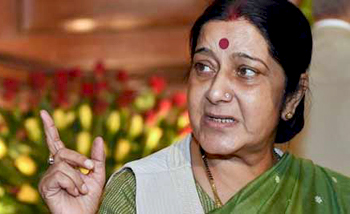New Delhi, Apr 11: Sending out a strong message to Pakistan, India on Tuesday warned of serious consequences if authorities there went on to execute Indian national Kulbhushan Jadhav on charges of being a Research and Analysis Wing (RAW) spy.

Condemning Pakistan government's move to award death sentence to him, EAM Swaraj said, ''This is an act of premeditated murder by Pakistan.''
Warning Pakistan, the EAM said, ''I would caution Pakistan govt to consider the consequences for our bilateral relationship if they proceed on this matter.''
Calling Kulbhushan Jadhav as Hindustan ka beta, EAM Swaraj said, ''we will go out of the way to save him.''
The entire House is one and is standing with the government in whatever decision it takes, Rajya Sabha deputy chairman PJ Kurien assured Sushma Swaraj.
Earlier, Union Home Minister Rajnath Singh had assured Lok Sabha MPs that the Centre will do everything possible to save Kulbhushan Jadhav who has been awarded death sentence by Pakistan's military court on charges of being a Research and Analysis Wing (RAW) spy.
Speaking in Lok Sabha, Rajnath Singh said, ''The government of India strongly condemns Pakistan's move to send Kulbhushan Jadhav to gallows on false charges of being a spy.''
The Home Minister claimed that Kulbhushan Jadhav had a valid Indian visa and refuted Pakistan's claims that he was a spy.
Singh further informed the House that the Pakistan government had even denied consular access to Jadhav.
In March 2016, Pakistan security agencies kidnapped him and later produced him as spy. Pak authority had said that Kulbhushan had Indian passport. If he had Indian passport then how can he be termed as spy, Singh said.
Indian High Command demanded consular access to him and it wasn’t provided. Indian Govt condemn this decision by Pakistan Governmnt, he added.
The Home Minister, however, assured that ''India will do whatever it takes to save Jadhav and justice will be done.''
The assurance from the Home Minister came after the Opposition parties raised the matter in Lok Sabha and sought PM Narendra Modi's intervention in the case.
Meanwhile, Prime Minister Narendra Modi is expected to reply on the issue of death sentence to Indian national Kulbhushan Jadhav in Pakistan.
Earlier, Congress party had given an adjournment motion notice in Lok Sabha. Meanwhile, protests have broken out against at several places in India against Pakistan, including its High Commission, against the death sentence handed to Jadhav on charges of “spying”.
The Indian Government had on Monday summoned Pakistan High Commissioner Abdul Basit and issued a demarche against Pakistani military court for awarding death sentence to Jadhav.
The Ministry of External Affairs (MEA) said the Indian High Commission in Islamabad was not even informed about Jadhav's trial in the court.
The Ministry added that the subsequent presence of Jadhav, who was kidnapped last year from Iran, has never been explained credibly by the Pakistani authorities.
"The proceedings that have led to the sentence against Jadhav are farcical in the absence of any credible evidence against him. Senior Pakistani figures have themselves cast doubt about the adequacy of the evidence," an official release stated.
"The claim in the Inter-Services Public Relations (ISPR) release that Jadhav was provided with a defending officer during the so-called trial is clearly absurd in the circumstances," it added.
The Ministry said the Indian Government, through its High Commission in Islamabad, repeatedly sought consular access to Jadhav, as provided for by the international law.
"Requests to that effect were formally made 13 times between March 25, 2016 and March 31, 2017. This was not permitted by the Pakistani authorities," it said.
"If this sentence against an Indian citizen, awarded without observing basic norms of law and justice, is carried out, the Government and people of India will regard it as a case of premeditated murder," it read.
Earlier, Jadhav was given the death sentence by the Pakistan Military, its media wing the Inter-Services Public Relations (ISPR) said in a statement.
Jadhav was arrested on March 3, 2016 through an operation in Balochistan's Mashkel area for his alleged involvement in espionage and sabotage activities against Pakistan, the ISPR said.
"The spy was tried through Field General Court Martial (FGCM) under the Pakistan Army Act (PAA) and awarded the death sentence. Today Chief of Army Staff Gen Qamar Javed Bajwa confirmed his death sentence awarded by FGCM," the ISPR said.
Jadhav was "tried by FGCM under section 59 of Pakistan Army Act (PAA) 1952 and Section 3 of official Secret Act of 1923," ISPR said.
The accused had been "provided with a defending officer as per legal provisions," the ISPR said.
Meanwhile, Amnesty International blasted Pakistan military court system for awarding of death sentence to Jadhav.
In a strongly worded statement, Biraj Patnaik, South Asia Director of Amnesty International said in New Delhi that military courts are an inherently abusive system that are best left to deal with issues of military discipline, not any other crime.
Earlier in March 2016, the Ministry of External Affairs said that the former Indian naval officer was arrested by Pakistan for allegedly engaging in subversive activities was possibly kidnapped from Iran and denied any possibilities of him being involved in subversive activities in Pakistan.
The accused, used to run a business in the Iranian port city of Chabahar. He was seen in a video confessing that he was an official of RAW.







Comments
Add new comment